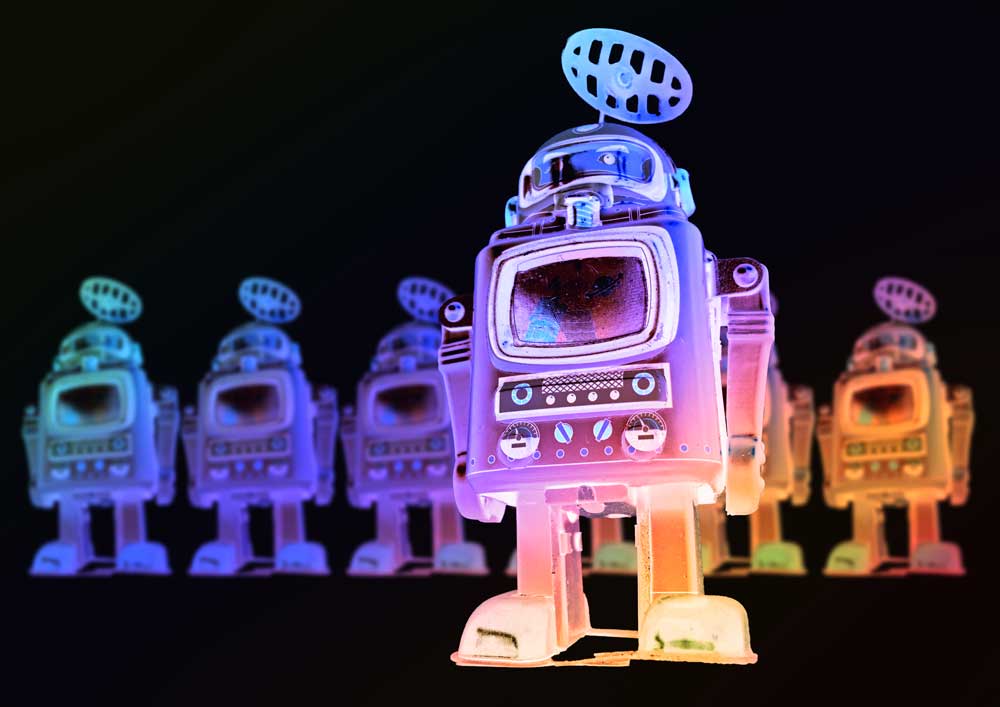
Is the creative industry safe from AI and machine learning?
It is reckoned that the creative sector in the UK is worth 87 billion pounds currently and is predicted to continue its growth to 128 billion by 2025. What’s more we are told that the creative community is highly resistant to automation, with 87% of creative workers at low or no risk.
I want to believe this, primarily because I spend all of my time with creative people and creative companies and personally all my close friends and family are engaged in the creative media world.
However, this year I have had reason to look more closely at AI and machine learning and I have heard and seen some disturbing early indications that the creative world is anything but exempt from the coming fundamental changes to our society. Let me explain why.
AI and machine learning have been with us for quite some time. Businesses have been working away developing and deploying their AI enhanced solutions to gain competitive advantage . We are all starting to recognize the benefits whether it is fun things like google maps or voice controlled devices through Alexa, Siri and the rest, or more fundamental things like driverless transportation and industrial automation.
When people like President Putin make statements that “whoever owns AI will rule the world” it’s time to pay attention. Where once it was about computing power so that Kasparov could be beaten at chess it is now machine learning where Ke Jie loses to Google’s AlphaGo, a game which relies more on human wisdom and intuition with a near infinite number of moves. The point is, humans are already being out performed at a few complex tasks but really this is just the beginning.
People look at past disruptive events and draw parallels, the invention of the plough, the steam engines, electricity, the internet etc. AI is the next big shift for the human species and like splitting the atom its potential for good is also balanced by it’s potential for bad. The difference this time is likely to be the exponential growth which is unlike anything we have ever seen before.
All other significant disruptors have take place over time periods long enough for humans to adapt. Even the internet has taken two or three decades to be better realised and taken advantage of.
AI, machine learning or what people are now describing as Artificial General Intelligence AGI will impact every aspect of our modern lives with such speed it is predicted that massive unemployment is inevitable and where new jobs are likely to be created they are unlikely to be on the same scale or appear at the same speed.
What I find more disturbing is until recently the goal it seemed was to match human intelligence. Now there is talk of side-stepping human intelligence in favour of machine intelligence. That is where we are creating something that will ‘think’ fundamentally differently to us. Where does that take us? Most agree that human intelligence will be surpassed but, the hopeful say, not human wisdom and the poetic add, not human love. My guess is that machines may not care about these things and if they ever do they will adapt and incorporate them.
Right now access to data is essential for machine learning and AI to develop and improve. So it is no surprise Google, Facebook, Amazon, Microsoft, Apple, are the noticeable high profile developers with Elon Musk and others championing Open AI to help democratise the new power.
So bringing this back to the creative media world. I optimistically hope for an augmented creative process. After all that’s where we are right now isn’t it? We use computers to produce most of our media output and distribution. The software and hardware are essential tools to most design work. Computer simulation adds to our understanding and creative process. Surely AI will remove the mundane and repetitive tasks, the laborious and time sucking processes? It will look at our data sets and help us make informed decisions of what to do next, brilliant, yes?
Well yes AI will do all of this but I now see it doesn’t stop there. Lets ignore for a second that we already have AI producing a Rembrandt type oil paining using 3D printers. Break down your creative process into enough parts and I start to recognize that large areas of creative activity will be moved away from humans to AI controlled processes. The main reason this will happen I think is we humans are really slow at the output part. Absolutely brilliant at input through sight and sound but fundamentally flawed at output through use of our hands or mouths. Computers with AI are going to be brilliantly fast at output.
The shift has already started but we are really at the start of the parabolic curve of change. We will use AI initially to speed up what we do, any mundane or repetitive tasks will be first to go, then complex tasks that take time will be next, analysis and experimentation swiftly after that, and then execution of the task itself. In the optimistic scenario humans stay in control and guide the AI to a conclusion. In the less optimistic future humans are too slow to keep up with their own demand and remove themselves from the process entirely. The difference between these two scenarios to my mind is time and/or political and social decision making.
I remain optimistic about the positive benefits of AI in the creative world especially short term. However we should all be concerned with the use of unregulated AI right now and certainly in the future.
And lastly, our current education processes that teach memory based learning were built for the industrial revolution and are totally inappropriate for the AI revolution we now face. Creativity and innovation will be the valued skills of the near future, and at least that is something to be hopeful of.